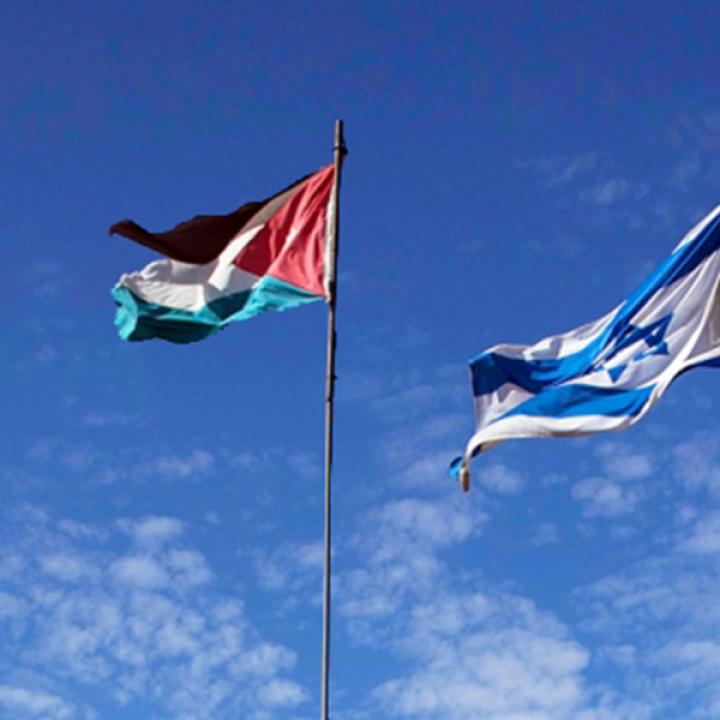
- Policy Analysis
- Policy Alert
Getting the Israel-Jordan Relationship Back on Track

The deterioration seen in recent years has diplomatic, political, economic, and even personal roots, and their collective effect has been to hold back everyone’s interests, including Washington’s.
On March 10, Crown Prince Hussein bin Abdullah of Jordan canceled a trip to pray at al-Aqsa Mosque in celebration of al-Isra wal-Miraj, a Muslim holiday commemorating the Prophet Muhammad’s fabled midnight journey from Mecca to Jerusalem in 621 AD. Israeli reports claim the visit was scratched due to a disagreement surrounding the number of palace security guards permitted to cross the border. According to Jordanian officials, however, Israel had asked for unacceptable limits on Palestinian worshippers at the site during the visit. Either way, the misunderstanding further complicates the Israel-Jordan relationship, which has been steadily deteriorating despite a few positive signs.
The two countries have been at peace since signing the Wadi Araba treaty in 1994, and the intervening decades have seen a broad range of mutually beneficial cooperation—cross-border business ties that employ thousands of Jordanians, expanded Israeli natural gas sales to the kingdom, close collaboration on allocating scarce water resources, and more. They have also forged especially productive (if not intimate) strategic ties in terms of military-to-military relations and intelligence sharing.
In recent years, however, the once-warm relationship between the two governments has chilled significantly. The still-unresolved 2014 killing of a Jordanian judge at an Israeli border post at Allenby Bridge has long been an irritant. It was exacerbated in 2017 when an Israeli security guard killed two Jordanians—including an innocent landlord—while responding to a terrorist attack at the Israeli embassy in Amman. The embassy was vacated as a result, and the palace bristled at Prime Minister Binyamin Netanyahu’s handling of the incident’s aftermath, from leaking a phone call with the guard to welcoming him at the premier’s residence as a hero. Amman responded by releasing the guard’s name and personal information, a substantial breach of diplomatic protocol.
Beyond these aggravations—which were partly smoothed over in January 2018 when Israel agreed to pay $5 million in compensation and reopen the embassy—Jordan remains frustrated that Jerusalem reneged on its 2013 commitment to participate in the Red Sea-Dead Sea Conveyance Project (aka “the Red-Dead”). This venture, which would provide desalinated potable water to both the West Bank and the kingdom’s Aqaba region, was originally envisioned as a regional cooperation project. Yet Israel eventually balked, deeming the plan “uneconomic.” This reversal has dampened Amman’s enthusiasm—perhaps fatally—for other potentially profitable undertakings with Israel, including Jordan Gateway, a cross-border industrial, commercial, logistical, and medical hub situated between Irbid and Nazareth.
Israel’s construction of Ramon Airport near Eilat generated bilateral controversy as well. Opened in 2019, the airport is less than six miles from Jordan’s King Hussein International Airport and less than half a mile from the border. In 2015, Amman filed a complaint with the UN’s International Civil Aviation Organization claiming that this proximity could interrupt air corridors. The kingdom’s concerns were not meaningfully addressed, however, and the matter remains not only an irritant, but a regrettable missed opportunity for commercial cooperation.
A more serious friction point emerged last year, when Israel floated and then scrapped plans to annex West Bank lands. Moreover, these isolated problems have occurred against a backdrop of perennial recriminations on various issues, including Jordan’s special role on the Temple Mount.
Israeli officials express frustration with the relationship as well. Chief among their complaints is Jordan’s perceived reticence toward more overt cooperation since signing the 1994 treaty, and its hesitance to publicly articulate any of the kingdom’s dividends of peace with Israel. They also argue that Jordan likes to complain about such things as economic access to the West Bank but rarely makes practical suggestions on how to improve the situation, and that its diplomacy on Palestinian issues in multilateral forums is prone to unhelpful hyperbole.
Some of this deterioration can be traced to personal and historical factors. In 1997, when King Abdullah was still a prince serving as head of the country’s special forces, Netanyahu ordered a botched hit against Hamas leader Khaled Mashal on Jordanian territory. A lot of time has passed since then, but the perceived affront against Amman’s sovereignty surely rankled the soldier and future king. Whatever the case, he never appeared to develop a good personal relationship with Netanyahu, and the prime minister reportedly has not spoken with him directly in three years. On March 11, Israeli defense minister Benny Gantz attributed this dynamic to “the failure of the Netanyahu government.”
Whoever is to blame, the deterioration is cause for concern in Washington. As beneficial as Israel’s Abraham Accords with Gulf states may be, the entire region will be less secure and stable if the fundamental peace pillars erected before them—the treaties with Egypt and Jordan—are allowed to founder. Jordan serves as Israel’s strategic depth to the east, and its cooperation with Jerusalem is a key factor in any “by, with, and through” U.S. defense strategy in the Middle East.
To ensure that this crucial relationship is sufficiently robust, Washington should take the following steps toward helping its longtime friends move past an unhelpful dynamic:
- Urge both governments to reestablish empowered channels for quickly and quietly resolving any new disputes.
- Mediate the resolution of outstanding bilateral irritants wherever possible.
- Explore ways to guarantee that Jordan benefits directly from the new dynamics and opportunities created by the Abraham Accords.
David Schenker recently rejoined The Washington Institute as a senior fellow after serving as assistant secretary of state for Near Eastern affairs in the Trump administration. Ghaith al-Omari is a senior fellow in the Institute's Irwin Levy Family Program on the U.S.-Israel Strategic Relationship.




